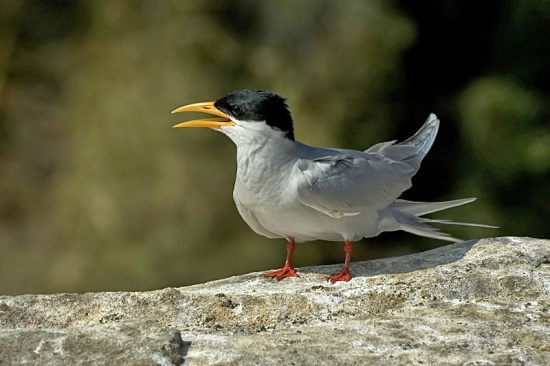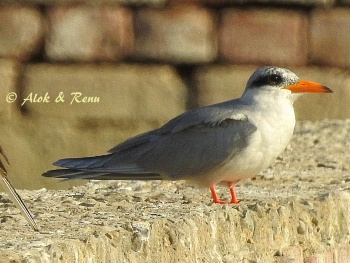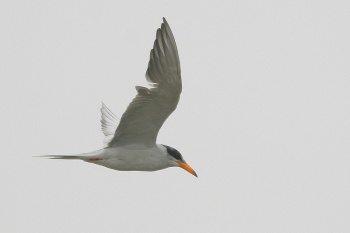- Sterna aurantia
Identification
38–46 cm (15-18 inches)
Breeding
- Black crown
- Dark grey upperparts
- White underparts
- Black lores
- Deeply forked tail with long flexible streamers
- Long pointed wings
- Stout yellow bill
- Red legs
Winter
- Greyish-white cap with black streaks
- Dark eye mask
- Dusky bill tip
The sexes are similar
Juveniles
- Brown head
- Grey upperparts with brown marks
- Grey breast sides
- White underparts
- Yellowish bill with a dark tip
Distribution
Asia: found from Pakistan to southern India, Sri Lanka, Nepal and south-western China.
Occasionally observed in Iran.
Taxonomy
This is a monotypic species[1].
Habitat
Breeds on the sandy islands of freshwater inland rivers and lakes. They rarely visit coasts and estuaries.
Behaviour
Diet
Their diet consists of fish, crustaceans, tadpoles and aquatic insects. Has been recorded as eating a frog.
They feed by plunge-diving.
Breeding
They nest in a ground scrape, often on bare rock or sand. The clutch contains 3 greenish-grey to buff eggs, which are blotched and streaked with brown.
References
- Clements, J. F., T. S. Schulenberg, M. J. Iliff, D. Roberson, T. A. Fredericks, B. L. Sullivan, and C. L. Wood. 2018. The eBird/Clements checklist of birds of the world: v2018. Downloaded from http://www.birds.cornell.edu/clementschecklist/download/
- Handbook of the Birds of the World Alive (retrieved June 2015)
Recommended Citation
- BirdForum Opus contributors. (2025) River Tern. In: BirdForum, the forum for wild birds and birding. Retrieved 10 May 2025 from https://www.birdforum.net/opus/River_Tern
External Links
Search the Gallery using the scientific name:
Search the Gallery using the common name:
GSearch checked for 2020 platform.






